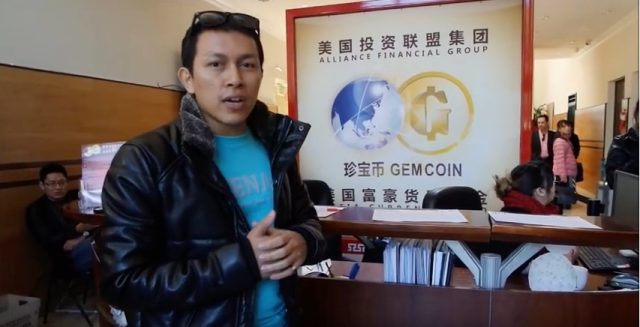
Thousands of people in the United States and abroad are believed to have put money into the company, converting their cash into "Gemcoin," a Bitcoin-like cryptocurrency.
Numerous online promotional videos in many languages claim that Gemcoin’s parent company, Alliance Finance Group (AFG) and its subsidiary United States Fine Investment Arts (USFIA), controlled $50 billion in amber mine assets in Latin America.
"We allege that the defendants’ false claims of riches that investors would realize from USFIA’s amber mining activity never materialized," Michele Wein Layne, director of the Securities and Exchange Commission’s Los Angeles office, said in a Thursday statement. "In reality, as alleged in the complaint, the defendants were operating a fraudulent pyramid scheme that left many investors with nothing."
The unveiling of the federal civil lawsuit comes days after the United States Marshals Service and the Arcadia Police Department froze assets and raided corporate offices at 135 East Live Oak Avenue in Arcadia, north of downtown Los Angeles. The companies now operate under a court-appointed receiver, Thomas Seaman, who did not return Ars' request for comment.
That building is the corporate address for AFG, USFIA, and a number of other companies owned by a man named Steve Chen, who authorities believe is the head of this entire operation.
Neither Chen, nor USFIA’s attorney Andy Beal, responded to Ars’ repeated requests for comment.
Zero, zilch, nada
According to the civil complaint accusing Chen of securities fraud he had initially offered investors "shares" in the company in April 2013:
Investors in USFIA received units of ownership in USFIA. Chen represented that these units would be convertible to USFIA common stock, on a 1:1 basis, when USFIA went public. Chen also told investors that when USFIA went public, its common stock would not be worth less than $20 per share. USFIA identified the units as "points" in the investor accounts it maintained on its computer system.
In addition to receiving units or points in USFIA, investors also typically received an amount of amber, purportedly equal to 30 percent of their investment. USFIA did sent the amber to investors, but upon obtaining appraisals of the amber, investors learned that the amber was practically worthless.
Investor packages were sold in various amounts, ranging from $1,000 to $30,000. As with any type of pyramid scheme, early investors who managed to sign up more people downstream were paid out.
By September 2014, Chen told investors that these points would be converted into Gemcoin.
But, as the SEC concluded: "Indeed, USFIA never engaged in an IPO and investors have been unable to sell or auction off their Gemcoins, and their value is de minimis."
A tangled web
Another curious element of the entire Gemcoin scheme is that many of the investors seem to be Chinese immigrants and Chinese-Americans.In recent decades, the San Gabriel Valley region of Los Angeles, including surrounding suburbs like Arcadia, has become home to large numbers of Chinese people and people of Chinese descent—including Arcadia City Councilman (and former mayor) John Wuo.
In August 2015, an Arcadia resident named David Arvizu appeared twice before an Arcadia City Council meeting showing what he claimed were photographs of Wuo at numerous Gemcoin events. He reiterated his request that Wuo explain his association to Gemcoin and to Steve Chen. Wuo did not speak during that portion of the meeting. Wuo also did not respond to Ars’ request for comment.
However, before the raid, the Los Angeles Times reported on September 10 that Wuo spoke before local Chinese-language media earlier in the year, calling Gemcoin a "breakthrough in finance." In May 2015, Wuo also apparently spoke glowingly of Chen, calling him "one of the quickest thinkers" he had ever known.
But on September 10—the same day that a number of local Arcadia residents and Gemcoin investors filed reports with police—Wuo told the Times that he didn’t have "any association" with Gemcoin.
Lt. Mike Castro of the Arcadia Police Department told Ars on Thursday that local law enforcement first learned of the alleged Gemcoin scam when Arvizu brought it up."We started interviewing victims that were alleging fraud," he said, noting the agency had spoken with as many as a dozen people before realizing that the FBI was already investigating. "We [then] turned our information over to the FBI."
The SEC also says that Chen was interviewed by the Arcadia Police on September 15, 2015. He is accused of immediately attempting to wire $7.5 million out of USFIA’s bank account at Bank of America to a bank in China. That wire transfer was divided into two parts, one at $3.5 million, which was successfully sent, while the remaining $4 million was blocked.According to the San Gabriel Valley Tribune, Wuo was visited by federal authorities earlier this week.
Long Z. Liu, a local attorney, also told Ars that his clients believe that there are about 3,000 California-based investors, and around 10,000 across the United States. He plans on bringing a proposed class action lawsuit next week.
"Most people that I’ve talked to invested minimum $10,000," he said. "So if you do the math, in California alone that's about $30 million loss and in the US, $100 million. I wouldn’t be surprised if the number turns out to be bigger."
Even as this case begins to heat up, Liu acknowledged that recovering tens of millions of dollars in investors’ money may be a tall order. "I don’t think being made whole is a realistic expectation," he added. "I don’t think Steve Chen and his people, they are a real business. All the money they have, they got this money through fraudulent schemes. But I told people that getting some money back beats getting no money back."
reader comments
34